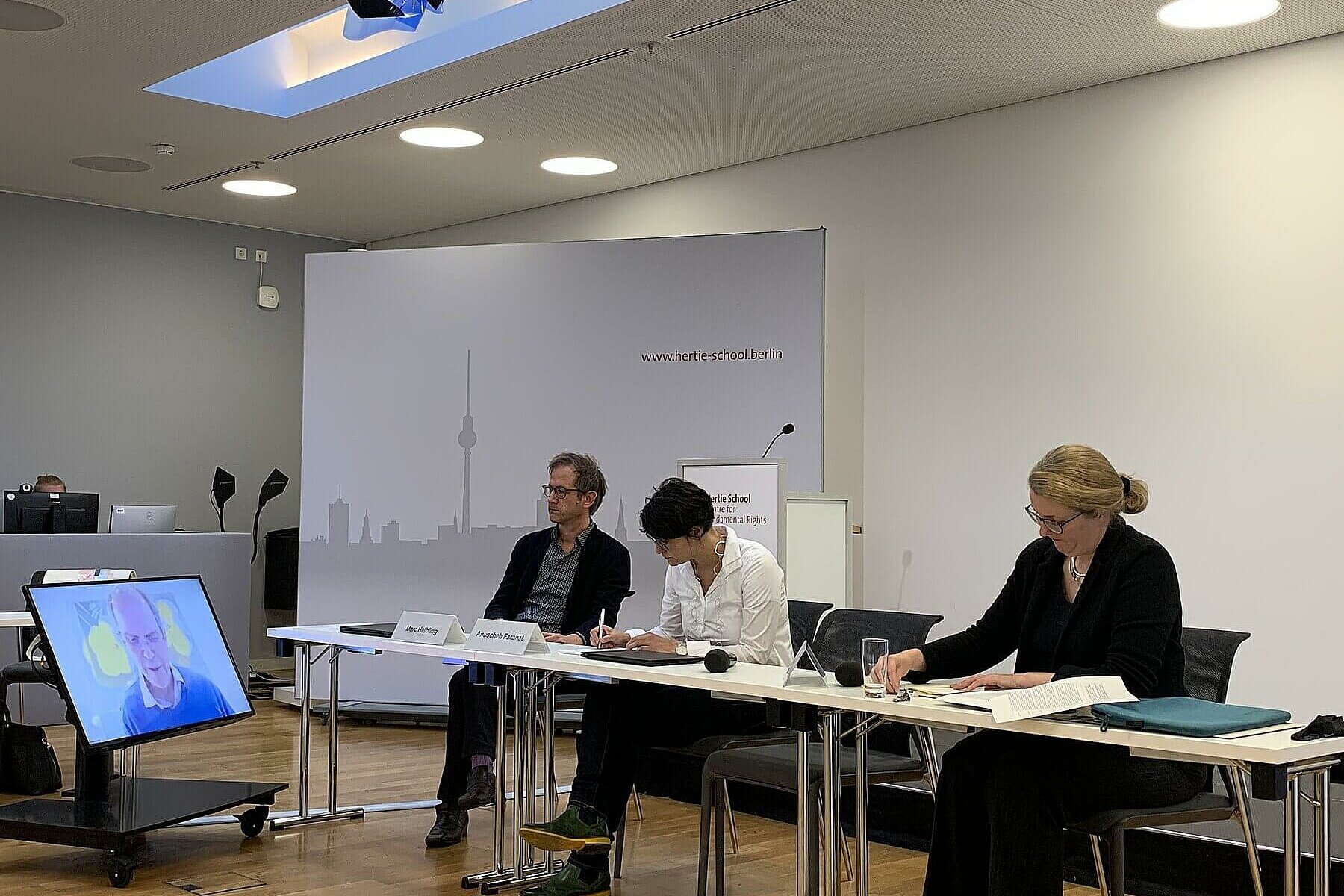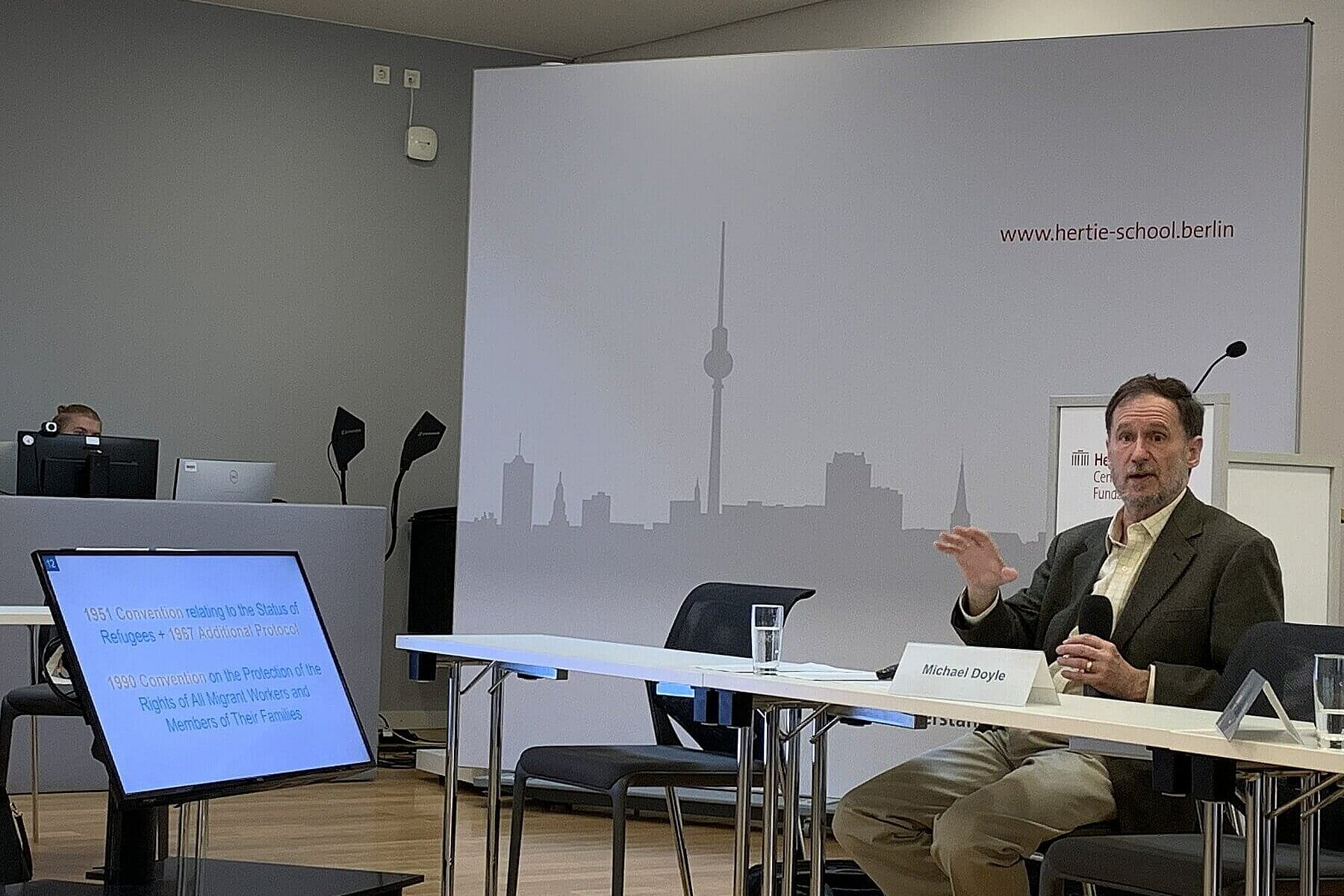Workshop: Revising the Model International Mobility Convention
Practitioners and scholars working on migration and refugee protection issues gathered at the Hertie School, Berlin to discuss emerging challenges in migration governance in the context of reform proposals to the text of the Model International Mobility Convention (MIMC). The ‘Revising MIMC: Finding Solutions to the Challenges of Today’s Migration’ conference was organised by the RefMig Project in association with the Wissenschaftszentrum Berlin für Sozialforschung (WZB) on October 13-14, 2022.
In 2015 and 2016, a group of more than 40 specialists in migration and refugee protection drafted the MIMC to address the overlaps and gaps in existing refugee protection regimes at the time. MIMC aimed to offer a “realistic utopia” that is comprehensive of the various forms of mobility and a cumulative protection of rights for the varying statuses under which people move across borders. The completed Convention with commentary was published as a special issue of the Columbia Journal of Transnational Law in 2018. The shortened version, MIMC 2.0, can be found on the Carnegie Council website.
While the MIMC addresses many of the gaps in the current international legal regime, it misses some important challenges, whose effects have become particularly prominent in recent years. Current challenges such as those to our environment, public health and democracy have deeply affected migrants and asylum seekers and have starkly demonstrated the inadequacy of our current system.
In the first panel of the workshop, Prof. Anuscheh Farahat (Professor of Public Law, Migration Law and Human Rights Law at the University of Erlangen-Nürnberg) presented on expanding the rights of migrant workers in the MIMC to ensure equal treatment. She observed that while non-discrimination is recognised under international law, unequal treatment of labour migrants remains a default. In this light, she discussed a transformative equality approach that goes beyond current non-discrimination laws. Her suggested improvements to the MIMC include permitting dual nationality for labour migration, going beyond the status quo and taking a treating migrants as ordinary and not as special human rights subjects, and considering how migration intersect with other types of laws. Prof. Rainer Baubock (Professor in the Global Governance Programme of the Robert Schuman Centre for Advanced Studies at the EUI) discussed the dilemma between domestic and global justice concerns in relation to Temporary Labour Migration (TLM) programmes. Contrary to Prof. Farahat’s approach, Prof. Baubock agreed with the MIMC’s approach of only including a floor of rights that is binding for TLMs.
In the second panel, Prof. T Alexander Aleinikoff (University Professor and Director of the Zolberg Institute on Migration and Mobility at The New School) and Prof. Doyle presented their ideas on expanding protection space for people displaced due to climate change. Prof. Aleinikoff noted that there is a need for a major shift in the way we think about displacement, leaving behind the 1950s notion that what warrants protection is breaking of bond between citizen and state. Based on the interpretation of the reasoning in the landmark cases of Torres Strait Islanders and Teitiota, Prof. Doyle suggested revising the standard for climate refugees to one that relates to ‘imminent threat’ instead of ‘risk of serious harm’. Dr Tamara Wood, who acted as discussant, noted that climate mobility is almost always multi-causal, meaning that climate change itself does not result in human mobility, but intersects with many other factors – poverty, government, social structures.
In the third and final panel, which focused on ‘New Challenges’, Kate Hooper (Migration Policy Institute) presented her work on ‘Digital Nomads’ and discussed the rise of remote work and related policy responses in different countries. In the final presentation, Professor Megan Bradley (Associate Professor of Political Science and International Development Studies at McGill University) and Dr Angela Sherwood (Lecturer in Law at Queen Mary University of London) talked about the role that the International Organisation for Migration (IOM) plays in the context of global mobility, and the need to think about its obligations and accountability. They noted that while the UNHCR is discussed substantially in the MIMC, this is not the case with regard to the IOM even though the latter has come to be a significant player.
The event concluded with closing remarks from Prof. Costello and Prof. Doyle who welcomed the participants to submit their suggested revisions to the MIMC and carry the discussions forward.
The workshop was convened by Professor Cathryn Costello (Professor of Fundamental Rights at the Hertie School and Professor of Refugee and Migration Law at the Refugee Studies Centre, University of Oxford), Professor Michael Doyle (University Professor of Columbia University and Senior Fellow and Director of the MIMC Project at the Carnegie Council) and Professor Liav Orgad (Director of the Research Group “Global Citizenship Governance” at the European University Institute and Head of the Group “International Citizenship Law” at the WZB Berlin).
Organising Committee
Mitali Agrawal (Hertie School), Prof. Cathryn Costello, Prof. Michael Doyle, Dorothea Henrike Koehn (Columbia University), Dr Michal Kramer (Hertie School) and Prof Liav Orgad
Programme
Panel I: Labour Migration Challenges for MIMC
Chair: Professor Cathryn Costello
Panellists: Professor Anusheh Farahat, New challenges and old problems: In search of equality and sustainability in labour migration law
Professor Rainer Baubock (online): The Elusive Triple Win: Addressing temporary labour migration dilemmas through fair representation
Commentator: Professor Marc Helbling
Panel II: The limits of refugee protection and climate-related displacement
Chair: Professor Liav Orgad
Panellists: Professor T Alexander Aleinikoff (online) A Changing Climate: The Opportunity to Expand Protection Along the Displacement Continuum.
Professor Michael Doyle (“Forced Migrants,” Human Rights and “Climate Refugees”)
Commentator: Dr Tamara Wood (online)
Panel III: New Challenges
Chair: Dr Grażyna Baranowska
Panellists: Kate Hooper Digital Nomads and MIMC (online)
Professor Megan Bradley & Dr Angela Sherwood IOM Unbound and MIMC (online)
Commentator: Professor Diego Acosta Arcarazo


